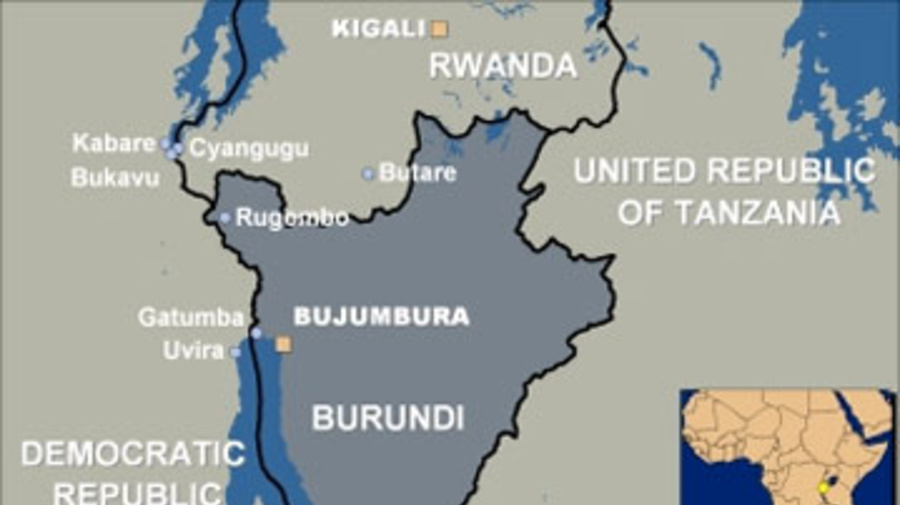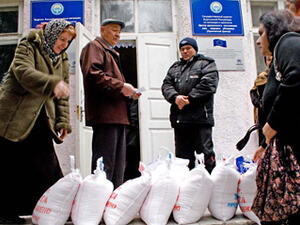More than 3,000 Congolese refugees in Burundi, says UNHCR
More than 3,000 Congolese refugees in Burundi, says UNHCR

BUJUMBURA, Burundi, June 11 (UNHCR) - More than 3,000 Congolese refugees have fled into neighbouring Burundi in the past two days, according to UN refugee agency staff who have travelled to the border of Burundi and the Democratic Republic of the Congo (DRC) to investigate reports of a new influx of refugees. Smaller numbers are still reported to be crossing the border.
The refugees are the second large group of people to flee the DRC since the most recent unrest began with an outbreak of fighting in eastern DRC's Bukavu town on May 26. More than 2,700 Congolese have also crossed into Rwanda in the last two weeks.
UNHCR and local authorities plan to start a registration of the new arrivals over the weekend.
The team travelled to the Burundi border on Thursday and included staff from UNHCR, OCHA (Office for the Coordination of Humanitarian Affairs), WFP (World Food Programme) and ECHO (European Commission Humanitarian Aid Office). They visited four main locations where refugee arrivals were reported and then returned to the capital, Bujumbura, before heading back out to the border today.
At the border, UNHCR, together with other UN agencies and non-governmental organisations, is today starting an emergency distribution of food provided by the WFP and other relief items to last the refugees for an initial 10-day period. UNHCR's partner, the International Rescue Committee, has begun work in the affected sites.
The largest group of refugees - 1,652 people, mostly women and children - are in the border town of Gatumba at the northern tip of Lake Tanganyika. They reportedly fled in panic from their homes in the Kimanga, Bien mal acquis, and Nyamyanda areas of Uvira in the DRC when they learned of the earlier events in Bukavu. They are reportedly in good health and are temporarily staying in a structure that was previously used for refugees who arrived in 2002 and have since been transferred away from the border to Gasorwe refugee camp.
Another large group of 1,040 refugees are staying in Cibitoke centre. They are mainly farmers from Bwegera in the DRC. To reach Burundi, they had to cross the Ruzizi river, sometimes floating on plastic jerry cans. The team found this group in worse condition and with fewer resources of their own than those who arrived at Gatumba.
Two smaller groups of refugees were also identified by the mission. Some 60 people are staying at Rugombo communal centre. They fled from the towns of Ngueshi, Walungu, Kamanyola, Luvunge and Katogote after hearing gun shots in the distance. Three kilometres away, another group of 100 people was found, most of whom are students between the ages of 14 and 18. The students were leaving school when they saw their family members and neighbours fleeing and joined them.
UNHCR has chaired a meeting in Bujumbura to bring together humanitarian agencies and government officials to work out a response to the new arrivals, including the current aid distribution getting underway.
Humanitarian agencies are looking into the possibility of relocating the refugees away from the border, barring immediate improvements in the situation in the DRC. The refugees could be transferred to Gasorwe refugee camp, which currently shelters some 8,000 Congolese refugees who fled in previous years, and which could accommodate another 2,800 people. Similarly, Songore transit centre, which formerly was used as a holding centre for Burundian returnees, could provide lodging for 1,000 refugees.
UNHCR is also trying to identify other plots of lands in Burundi's Ngozi province where shelter could be set up.
Meanwhile, UNHCR spokesman Kris Janowski told a press briefing in Geneva, "We are closely monitoring developments in the DRC to be ready to help if any more refugee arrivals are reported."









